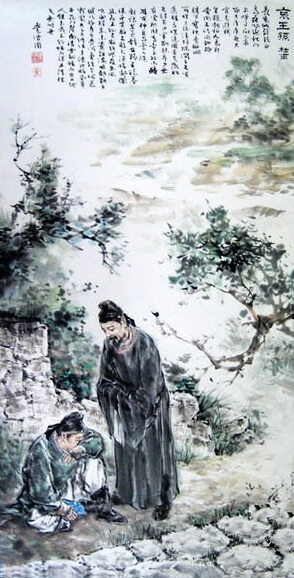A Song of a Prince Deposed
- Poetry of Du Fu

Along the wall of the Capital a white-headed crow
Flies to the Gate where Autumn Enters and screams there in the night,
Then turns again and pecks among the roofs of a tall mansion
Whose lord, a mighty mandarin, has fled before the Tartars,
With his golden whip now broken, his nine war-horses dead
And his own flesh and bone scattered to the winds....
There's a rare ring of green coral underneath the vest
Of a Prince at a street-corner, bitterly sobbing,
Who has to give a false name to anyone who asks him-
Just a poor fellow, hoping for employment.
A hundred days' hiding in grasses and thorns
Show on his body from head to foot.
But, since their first Emperor, all with hooknoses,
These Dragons look different from ordinary men.
Wolves are in the palace now and Dragons are lost in the desert --
O Prince, be very careful of your most sacred person!
I dare not address you long, here by the open road,
Nor even to stand beside you for more than these few moments.
Last night with the spring-wind there came a smell of blood;
The old Capital is full of camels from the east.
Our northern warriors are sound enough of body and of hand --
Oh, why so brave in olden times and so craven now?
Our Emperor, we hear, has given his son the throne
And the southern border-chieftains are loyally inclined
And the Huamen and Limian tribes are gathering to avenge us.
But still be careful-keep yourself well hidden from the dagger.
Unhappy Prince, I beg you, be constantly on guard --
Till power blow to your aid from the Five Imperial Tombs.
Folk-song-styled-verse
This poem was composed in the autumn of 756 CE, the first year of the Zhide era under Emperor Suzong, which marked the second year of the An Lushan Rebellion. In the sixth month of that year, rebel forces breached the Tong Pass. Emperor Xuanzong fled in disarray to Shu, and the capital, Chang'an, fell. Du Fu, attempting to escape with his family, was captured by the rebels and taken back to Chang'an. Due to his low official rank, he was not placed under close guard, allowing the poet to move with difficulty through the occupied capital. He thus witnessed with his own eyes how this former imperial heart—where once "envoys from all states paid homage to the crown"—had been turned to ruins by war. This poem was written while Du Fu was trapped behind enemy lines, after he personally witnessed the wretched and tragic state of fallen imperial scions. It not only records the suffering of a specific historical moment but also uses the individual fate of a single "princeling" as a microcosm, revealing war's ruthless crushing of all order and dignity. The poem is imbued with the poet's profound compassion and an unextinguished faith in eventual restoration.
长安城头头白乌,夜飞延秋门上呼。
又向人家啄大屋,屋底达官走避胡。
金鞭断折九马死,骨肉不得同驰驱。
腰下宝玦青珊瑚,可怜王孙泣路隅。
问之不肯道姓名,但道困苦乞为奴。
已经百日窜荆棘,身上无有完肌肤。
高帝子孙尽隆准,龙种自与常人殊。
豺狼在邑龙在野,王孙善保千金躯。
不敢长语临交衢,且为王孙立斯须。
昨夜东风吹血腥,东来橐驼满旧都。
朔方健儿好身手,昔何勇锐今何愚。
窃闻天子已传位,圣德北服南单于。
花门剺面请雪耻,慎勿出口他人狙。
哀哉王孙慎勿疏,五陵佳气无时无。
- Why Chinese poems is so special?
- The most distinctive features of Chinese poetry are: concision- many poems are only four lines, and few are much longer than eight; ambiguity- number, tense and parts of speech are often undetermined, creating particularly rich interpretative possibilities; and structure- most poems follow quite strict formal patterns which have beauty in themselves as well as highlighting meaningful contrasts.
- How to read a Chinese poem?
- Like an English poem, but more so. Everything is there for a reason, so try to find that reason. Think about all the possible connotations, and be aware of the different possibilities of number and tense. Look for contrasts: within lines, between the lines of each couplet and between successive couplets. Above all, don't worry about what the poet meant- find your meaning.
- Gazing at Lake Dongting
- Eastern Hamlet, Northern Slope
- My Neighbor South
- By Waterside I
- Waves Sifting Sand I
- Lament for Spring II